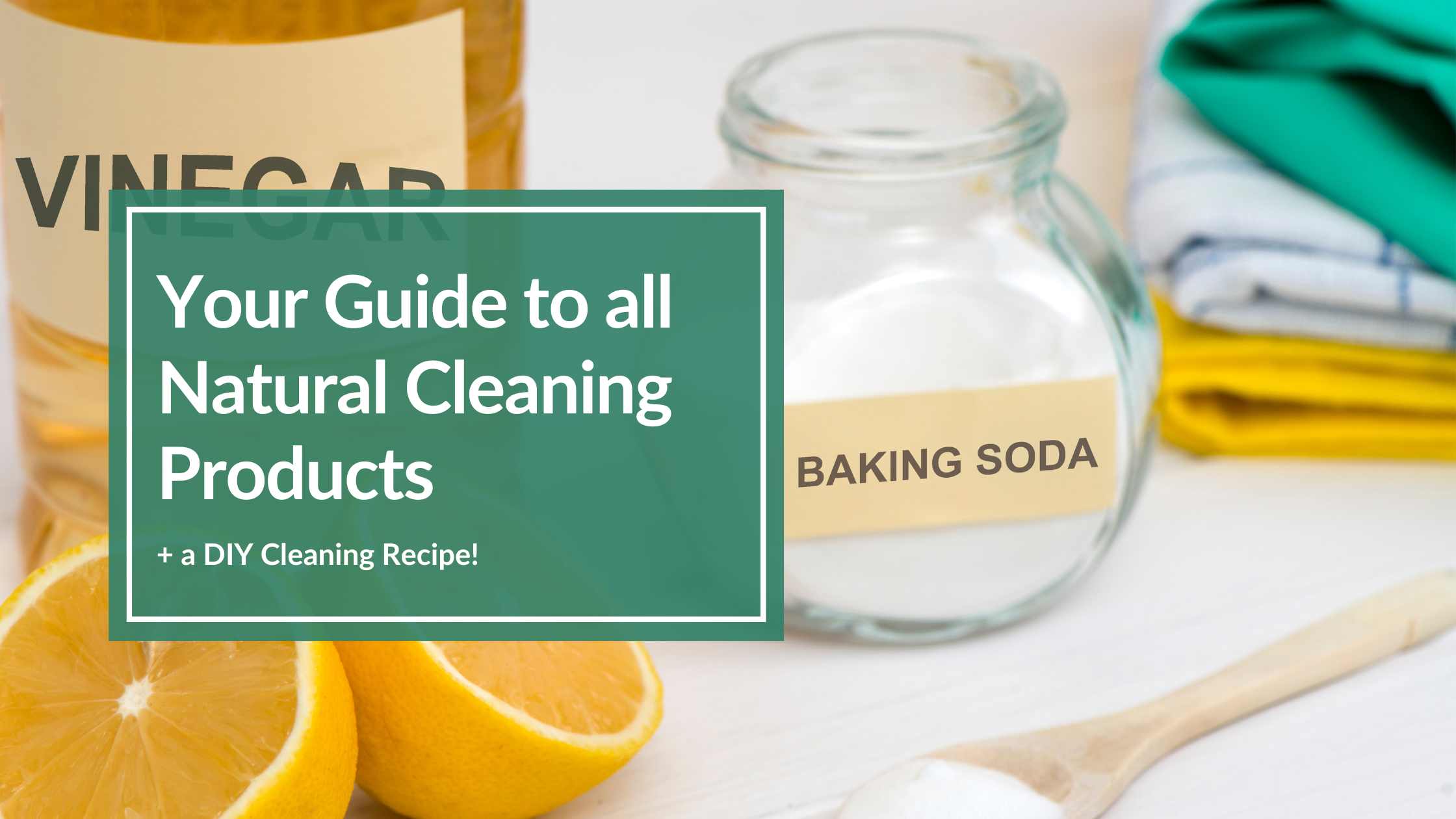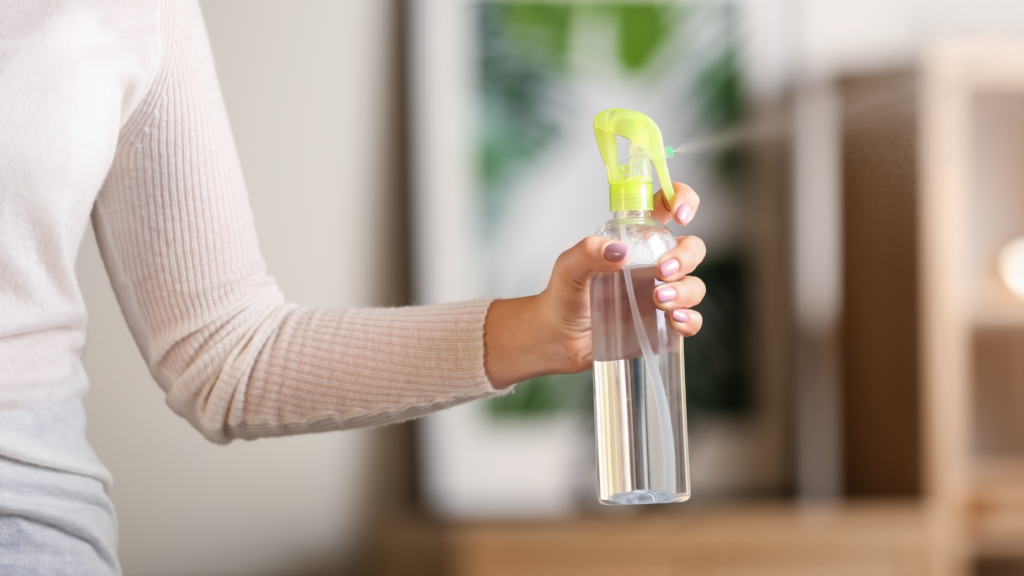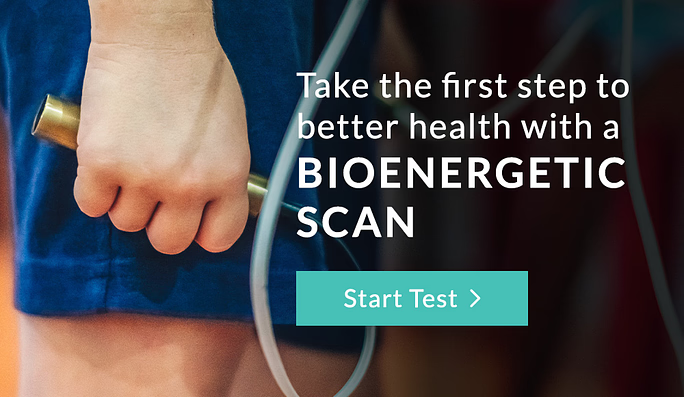
Are you using all-natural cleaning products yet?
Or, are you hesitant to use all-natural cleaning products? Are you concerned about the effectiveness of non-toxic cleaning products like white vinegar, essential oils, and baking soda? How can you kill bacteria and viruses with simple things like vinegar?
Perhaps you’re concerned about the chemicals in regular products, which is why you are here.
One of the big worries about chemicals in regular products is the growing number of PFAS. This stands for Perfluoroalkyl and Polyfluoroalkyl Substances. PFAS have been used since the 1950s. These are known as “forever” chemicals. Once these chemicals enter the environment, they do not break down. They remain in the body for years (1).
According to the Wisconsin Department of Health Services, there are forever chemicals that resist grease, heat, and water. There are thousands of them. The most common types are PFOA (perfluorooctanoic acid) and PFOS (perfluorooctane sulfonate). These chemicals were used in Teflon pans.
Currently, the EPA, or Environmental Protection Agency, states:
- “PFAS are found in the blood of people and animals all over the world and are present at low levels in a variety of food products and in the environment”.
- “PFAS are found in water, air, fish, and soil at locations across the nation and the globe.”
- “Scientific studies have shown that exposure to some PFAS in the environment may be linked to harmful health effects in humans and animals (2).“
There are still cleaning and household products that contain PFAS, including specialized floor cleaners, grease repellants, even water repellants, and your hiking jacket may still contain PFAS. CBS News reported on some surprising brands of consumer and household items that may still contain PFAS.
Are toxic chemicals something we seem to have to live with?
The short answer is yes. But remember, reduction is possible! You can reduce the number of chemicals and the increase in PFAS in your home and body by switching to all-natural cleaning products. You can even make them yourself.
If you are asking if non-toxic cleaning products are effective against common bacteria, read on!
Regular Products vs. All-Natural Cleaning Products
Many harsh chemicals are still found in conventional cleaning products. They are also hard on surfaces. Yet, they seem to be effective against certain hard-to-kill microbes like norovirus or Giardia, don’t they?
At least that’s what the marketers tell us.
We also confuse the eradication of germs with the term “cleaning” and think we are disinfecting. Cleaning is not disinfecting. Cleaning hard surfaces is certainly necessary to maintain overall health, especially after a winter cold or flu!
Disinfectants are different and also need a particular concentration and duration of contact to properly work. (These also can contain harsh chemicals.) Concentration comes into play when people think that undiluted cleaners and disinfectants must work better, and do not follow the instructions on the package. Then we have increased skin contact and respiratory contact, which can be harmful. Something to think about when your Respiratory System Dial looks stressed on bioenergetic testing, AND energetic sensitivities like:
- Ammonia
- Cleaning Supplies
- Fabric Mix
- Carpet Mix
- Leather
You may not know that when you mix certain chemicals, like bleach and ammonia, and you increase toxicity. Whew. That’s a lot!
Don’t worry, we are going to break down the effectiveness of all-natural cleaning products and share the difference between cleaning, sanitizing, and disinfecting! We’ll also share a recipe for making your own DIY non-toxic cleaners using vinegar and essential oils. You’ll understand their benefits, roles, and how (and when) to use them.
Many of our clients come to us already using natural cleaners, or they switch to all-natural cleaning products after seeing Endocrine System stress, chemicals, and metals resonating on their CBH Full Scan Report. The concern about chemicals goes beyond the forever chemical worry. Many are endocrine-disrupting chemicals that can have an effect on estrogen and other hormones in mammals.
If you have been reluctant to make the switch, it may be due to fear of not killing bacteria and viruses that potentially could make you sick.
Yet more and more, people are worried about regular household cleaners making their way into their system, increasing their toxic load, and complicating their health.
These cleaners also make their way into your pet ‘s skin on paw pads, which your pet licks daily!
DIY non-toxic cleaners are becoming increasingly popular as more and more people are looking to reduce their exposure to harmful chemicals. Not only are these cleaners safe to use, but they can also be effective against some harmful bacteria. And they save you money.
Vinegar and essential oils are often cheaper than commercial cleaning products, especially when bought in bulk. We mean vinegar, not necessarily bulk buying essential oils. Some essential oils do evaporate. Because of this, we only recommend small bottles of essential oils, even if you use them for many purposes, including skin irritations and diffusing.
Creating balanced health includes a cleaner, healthier, and safer home. It doesn’t have to be complicated. But will white vinegar do the trick for germs that lurk on surfaces in your home?
Well, it depends on the germ. First, let’s unpack the differences between cleaning, sanitizing, and disinfecting.
Cleaning vs Disinfecting
Cleaning is defined as a process that “removes most germs, dirt, and impurities from surfaces. Clean with water, soap, and scrubbing “(3).
“Sanitizing reduces germs to levels public health codes or regulations consider safe. Sanitizing is done with weaker bleach solutions or sanitizing sprays. Clean surfaces before you sanitize them.”
“Disinfecting kills most germs on surfaces and objects. Disinfection is typically performed with stronger bleach solutions or chemicals. Clean surfaces before you disinfect them.”
As Tanya, one of our CBH Practitioners and a retired dental hygienist, points out, scrubbing with soap and water can remove many germs from skin and surfaces, as the action of the scrubbing (especially under the nails) reduces the overall microbial load. This can be for hands or countertops!

Why Vinegar and Essential Oils for All-Natural Cleaning Products?
Before we set you off on recipe-making of your all-natural cleaning products, do you know what vinegar and essential oils are? Vinegar, simply put, is a liquid produced from the fermentation of alcohol, which happens through yeasts and acetic fermentation.
This two-stage fermentation process, the first being the conversion of fermentable sugars into ethanol by yeasts, generally Saccharomyces species, and the second being the oxidation of ethanol by bacteria, generally Acetobacter species, makes the vinegar you are so familiar with.
It’s a versatile product that’s been used for centuries in cooking, preserving food, and yes, even cleaning.
Essential oils, on the other hand, are concentrated plant extracts that capture the scent and flavor, or “essence,” of the plant. They’re obtained through methods such as distillation or cold pressing. Essential oils have been used for thousands of years for a variety of purposes, from religious rituals to medicinal uses.
In the context of cleaning, vinegar acts as a powerful disinfectant and deodorizer, while essential oils add a pleasant scent and additional cleaning properties. When combined, they create a potent yet non-toxic cleaning solution. There are certain essential oils that need to be avoided for pets.
Benefits of Vinegar and Essential Oils for All-Natural Cleaning Products
Using vinegar and essential oils for all-natural cleaning products offers numerous benefits, in addition to being non-toxic. The right combinations can make them safe to use around children, pets, and those with sensitivities or allergies.
Moreover, vinegar and essential oils are environmentally friendly! They’re biodegradable and don’t contribute to pollution, making them a better choice for the planet. You are reducing your exposure to those forever chemicals, those PFAS!
They’re also cost-effective!
Is Vinegar Effective in All-Natural Cleaning Products?
Vinegar is a versatile cleaner, thanks to its acidity. Its acetic acid content allows it to effectively cut through grease, dissolve mineral deposits, and kill bacteria. It’s excellent for cleaning a variety of surfaces, from kitchen countertops to bathroom tiles. It’s also a great deodorizer. Vinegar naturally neutralizes odors, leaving your home smelling fresh and clean.
Have you ever tried leaving out dishes of vinegar after you’ve had your home painted?
Vinegar isn’t suitable for all surfaces. Because of its acidity, it can damage certain materials like marble and other natural stones, and hardwood floors if used full strength, and left to dry. You also need to take care with some electronic screens. Always test a small, hidden area first before using vinegar to clean. We do think you’ll find it fine for many surfaces!
What about those microbes?
Vinegar has been shown in this study to kill the Influenza A virus. Influenza A, or the common flu, circles back to us on a seasonal basis. Do we need to rush out and purchase specific cleaners for our household surfaces to prevent the spread? The study on vinegar shows that concentrations between 10% and 50% vinegar were effective against the virus.
Vinegar can deactivate Giardia cysts. This can be useful when cleaning up contaminated fabrics, where you can’t, or don’t want to use bleach. Undiluted vinegar deactivated all Giardia cysts after 60 minutes, and diluted mixes decreased cyst population by up to 50% (5).
Are Essential Oils Effective in All-Natural Cleaning Products?
Essential oils will amplify the power of your all-natural cleaning products as well. Not only do they add a pleasant scent to your homemade cleaners, but many also have antimicrobial properties, helping kill germs and bacteria.
For instance, tea tree oil is known for its powerful antiseptic properties. This is because tea tree oil, or melaleuca, contains compounds such as terpene hydrocarbons, primarily monoterpenes and sesquiterpenes, along with their associated alcohols. This contributes to the broad-spectrum effectiveness of tea tree oil as an antibacterial, antifungal, antiviral, and antiprotozoal agent (6).
Lemon essential oil is documented as a natural antibacterial against Escherichia coli, otherwise known as E. coli (7). It’s also excellent at cutting through grease and grime. If you have ever had gum in your hair or that sticky residue left on a package or glass jar, your lemon essential oil is the best adhesive remover!
We know how powerful Wild Oil of Oregano is on the gut microbiome, so it stands to reason that using an oregano essential oil would be a powerful antibacterial cleaner. Add some lemon, if you find the smell off-putting!
DIY Recipe for All-Natural Cleaning Products
Now that you understand the benefits and roles of vinegar and essential oils in cleaning, it’s time to learn some DIY non-toxic cleaner recipes:
All-purpose cleaner.
Customize the dilution to the surface and purpose of the cleaner. This cleaner is great for kitchen countertops, bathroom surfaces, and more.
1 cup water
1 cup white vinegar
30 drops Essential Oil: use singly or a mix of Lemon, Lavender, and Melaleuca.
Add to a glass spray bottle – shake well before each use
Glass Cleaner
1 cup vinegar
1 cup water
5 drops of lemon or orange.
Mix all ingredients in a spray bottle. Shake before each use. Spray onto windows and wipe clean with a paper towel.
Floor Cleaner
2 cups water
1/2 cup vinegar
1/8 tsp dish soap
1/2 tsp vodka or rubbing alcohol
5-10 drops essential oil of your choice. We love lemon or orange for floors!
Other powerful oils include:
Remember, these are just basic recipes to get you started. Feel free to experiment with different essential oils and vinegar ratios to create your perfect cleaning solution.
Are There Safety Precautions When Using All-Natural Cleaning Products?
While vinegar and essential oils are safer than many commercial cleaning products, they still need to be used with care. Vinegar is an acid and can cause eye and skin irritation. If you are sensitive, please wear gloves when using vinegar and avoid getting it in your eyes.
Essential oils are highly concentrated and can cause skin irritation or allergic reactions in some people. Always dilute essential oils before use and avoid contact with eyes and mucous membranes.
Remember, not all essential oils are safe for all members of your household.
The Impact of All-Natural Cleaning Products on the Environment
The impact of homemade cleaning products on the environment is significantly less than that of commercial cleaners. Commercial cleaning products often contain harmful chemicals that can pollute the air and water. In contrast, vinegar and essential oils are natural and biodegradable, making them much less harmful to the environment.
Moreover, making your own cleaners at home reduces waste. Instead of buying a new plastic bottle every time you run out of cleaner, you can simply refill the same bottle with your homemade solution.
Embracing all-natural cleaning products is not only good for your endocrine system and wallet, but for your whole family, and the earth. With the power of vinegar and essential oils, you can keep your home clean and fresh without resorting to harsh, toxic chemicals.
Essential oils have mood-boosting properties that lift us up! Who doesn’t need a mood boost while cleaning the house?
Now that you know how to make your own cleaners, why not give it a try and reduce your toxic load!
DISCLAIMER: Balanced Health, LLC/CBH Energetics and any parent, subsidiary, affiliated or related entities and companies do not provide medical advice or services. This post and the bioenergetic products and services offered by Balanced Health, LLC/CBH Energetics including, but not limited to, bioenergetic tests, bioenergetic scans, bioenergetic reports and related products and services (collectively the “Bioenergetic Products and Services”) are designed for educational and informational purposes only and are not intended to diagnose, treat, cure, or prevent any disease, condition, complaint, illness or medical condition and are not a substitute for professional services or medical advice. Testing is not used for the purpose of obtaining information for the diagnosis, prevention, or treatment of disease or the assessment of a health condition or for identification purposes.
